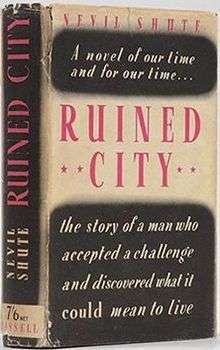Ruined City

Ruined City, is a 1938 novel by Nevil Shute, published by Cassell in the UK and in the US under the title Kindling by William Morrow.
Plot summary
The book tells the story of Henry Warren, a City of London financier and head of his firm, Warren Sons and Mortimer. Amid the Depression, Warren continues to make money through hard work floating loans and stock issues—but at a price. Although only in his early forties, he is starting to have health problems—and his wife is having an affair with another man. They separate, and divorce proceedings begin. One night, out of desperation, and telling no one, he orders his chauffeur to drive him to the North of England, as he wants to go on a hiking tour to clear his head and gain some perspective. His chauffeur sets him down many hours north of London. The chauffeur's death in a road accident while making his way back to London means that there is no one who knows where Warren is. Warren soon suffers severe intestinal pain and is taken to a hospital in the fictional Northumberland town of Sharples. The loss of his wallet deprives Warren of any evidence of his identity, and everyone assumes he is one of the many who are on the road, unemployed because of the Depression. Once he regains consciousness, he encourages this misconception.
Sharples, once a prosperous town, is so entirely bound up with the shipyard that was its major employer that when the shipyard failed, so did the town. Unemployment is very high, and few shops remain open, the entire town living on the dole. The hospital is still open, however, and Warren is operated on successfully. While recovering he learns of the town's plight, as he starts becoming attracted to the Hospital's Almoner, Alice MacMahon - a law graduate who never practised but who is fiercely loyal to her town. He continues the pose of being indigent, and watches as others die through listlessness and lack of strength. Eventually his convalescence is complete and he is discharged. By this time, he has managed to have money and cheque forms sent to him, and he gives a major gift to the hospital, keeping it quiet.
Warren now wants to help the town, both out of affection for Alice and out of belief that something must be done - and as head of his firm he is uniquely able to do so. He quietly buys the shipyard for a song with his own money, but knows of no legitimate way of securing that first order to start the shipyard going again. He sees no other way but to indulge in shady dealings (before this, his name was a byword for honesty).
Warren goes to the Balkan nation of Laevatia and begins bribing officials for control of the oil concession—once the concession is secured, the corporation which will result will need tankers to transport the oil. Thanks to the help of a courtesan, a dishonest card dealer, and other colourful characters, he is successful. The new corporation which Warren floats on the London stock market orders the tankers from the shipyard, which Warren also floats on the stock market. To make the float a success he states in its prospectus that the yard will make a profit, although he knows full well, and a letter he has received from the yard's manager reports, that the opposite will be true. This falsification of a prospectus was and is a serious criminal offence - as Warren well knows.
The shipyard slowly starts up again, and thus far Warren's plan works well. But when there is a revolution in Laevatia, the house of cards that Warren has built starts to collapse. Questions are asked around the Exchange, the damning letter comes to light, and Warren is arrested. The only way to keep the shipyard out of it is for Warren to take the responsibility entirely on himself. He does, and is sent to prison, where he serves two years and three months. He is completely unrepentant. Meanwhile, his love for Alice only awaits his release before they can be married. As a prisoner, without responsibility, he begins to recover his health and gain perspective on his life. As his good name in the City is ruined, and as he can never return to his former work, he thinks about what to do with the remainder of his life (what he decides is not made clear). He will still be a wealthy man, and still has energy.
Upon his release, he travels up to Sharples, telling no one of his coming. There is no resemblance between the bustling, prosperous town he now sees, and the derelict one he remembers. He walks to the shipyard, now busy with rearmament work, and sees a three-foot square bronze plaque at the gate. It shows the head and shoulders of a man, in profile, and the words "HENRY WARREN/1934/HE GAVE US WORK". He is much affected. He is recognised, and the entire town, including Alice, hurries to the shipyard to greet him.
Quotes
"There's only one cure for starvation--work! If only we could get some work back here. That's the only thing that allows you to be human and foolish, as you've got to be."
"'I believe that that's the one thing most worth doing in this modern world," he said quietly. 'to create jobs that men can work at, and be proud of, and make money by their work. There's no dignity, no decency, or health today for men that haven't got a job. All other things depend on work today: without work men are utterly undone.'"
Footnotes
The book is, to some extent, based on Shute's own experience at Howden in Yorkshire as Calculator of the R100 project (see Shute's autobiography "Slide Rule" pg 60 2nd Pan Edition 1969) and his experience as a director of Airspeed, Ltd..